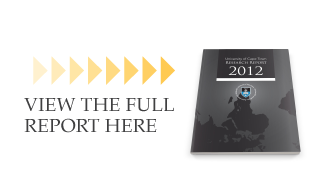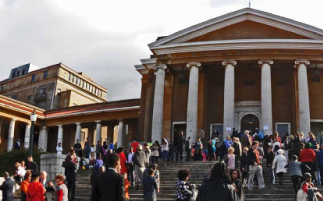 |
||
| It is the responsibility of the University of Cape Town to ensure that our research and innovation creates new information and pushes the boundaries of knowledge, for the development and transformation of society and the safeguarding of the planet. Our researchers have fulfilled this obligation admirably during the past year and I am pleased to present this report on research excellence at UCT during 2012. |  |
|
We are privileged to have an exceptional community of researchers at UCT. Contributions to research, and achievements during 2012, are outlined in the report presented by the Deputy Vice-Chancellor. We showcase some prominent areas of research and inter-disciplinary themes, which continue to emerge across the university, and which play a pivotal role in our research enterprise. Some of these are:
- the enormous contribution of research being undertaken in astronomy to the national flagship projects of the Karoo Array Telescope (MeerKAT) and the Square Kilometre Array (SKA), one of the largest scientific experiments of all time;
- research that has direct relevance to national policies aimed at poverty reduction, promotion of growth, and the reduction of inequality;
- world-leading research undertaken by the Institute of Infectious Disease and Molecular Medicine;
- research on the development of new forms of digital technology to address the developmental problems within society, problems that do not exist in developed economies, where most of the world’s technology is created; and
- innovative research into water treatment, which impacts a broad range of sectors, ranging from industrial and commercial applications, to impacting the lives of all South Africans in a more direct manner.
The above initiatives are making significant contributions to addressing societal problems and influencing growth and development, both in South Africa and on the continent. In addition to these, there are four inter-disciplinary, institution-wide initiatives that play an equally important role in solving current challenges: the Safety and Violence Initiative, the Schools Improvement Initiative, the African Climate and Development Initiative, and the Poverty and Inequality Initiative. An important milestone in 2012 was the hosting of Towards Carnegie3: Strategies to Overcome Poverty and Inequality on behalf of the National Planning Commission. The key purpose of the conference was to take stock of existing knowledge and debates and to stimulate crosspollination of ideas across institutional, thematic, and geographic barriers.
One of the challenges in realising our ambitions in the research arena is to be optimally placed to collaborate internationally and advance global knowledge, while still solving local problems. This includes developing new research partnerships or strengthening existing ones with partners in Africa, and elsewhere in the global South. Increasingly, research that makes a difference in the world is being conducted by international consortia and collaborations. In our endeavours to facilitate and maintain research collaboration with international partners, UCT remained an active member in 2012 of the Worldwide Universities Network, which comprises 19 researchintensive universities spanning six continents.
Contributing to the achievements reflected in this report are our postgraduate students and postdoctoral researchers. In 2012, more than 6 000 students were registered for honours, master’s, and doctoral degrees at UCT. At the same time, there were 282 registered postdoctoral researchers at the university, of whom more than half were from outside South Africa. Our responsibility to educate the future generation of leaders extends to the African continent. Through a generous grant from the Carnegie Corporation for the Next Generation of Academics project, a cohort of trainee academics are being trained in the fields of infectious diseases, civil engineering, and economics. This project has enabled us to work closely with the universities of Ghana, Makerere and Witwatersrand.
We are grateful to all our donors, partners and research collaborators for supporting our vision for the development of research at UCT, enabling greater impact and greater engagement. It is thanks to these individuals and organisations, and indeed the work of the entire university community, that we are able to continue to deliver world-class research that advances the university and this continent. It is our intention to continue to engage strategically with the changing higher-education landscape in South Africa and to build research partnerships across Africa that will help shape our future.














